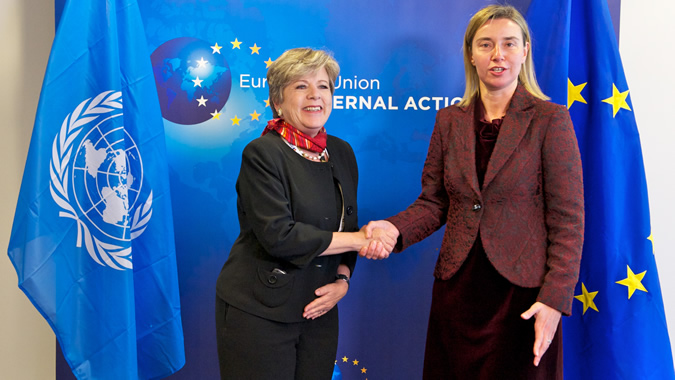In Brussels, ECLAC Highlights Spaces for Convergence and Cooperation between the European Union and the Region
Work area(s)
Alicia Bárcena met with the head of European diplomacy, Federica Mogherini, and spoke at the academic and business meetings carried out in the framework of the second EU-CELAC summit, which concludes tomorrow in Belgium’s capital.

Latin America and the Caribbean and the European Union can strengthen their cooperation even further in areas such as education and production, especially in terms of science, technology and innovation and small- and medium-sized enterprises (SMEs), thereby advancing along the path of sustainable development with equality, Alicia Bárcena, the Executive Secretary of the Economic Commission for Latin America and the Caribbean (ECLAC), said today in Brussels, Belgium.
Bárcena is in the Belgian capital participating in various events related to the second Summit of the Community of Latin American and Caribbean States (CELAC) and the European Union (EU), which is bringing together representatives of 61 countries from both regions today and tomorrow.
In this framework, ECLAC’s Executive Secretary held a meeting today with Federica Mogherini, the High Representative of the European Union for Foreign Affairs and Security Policy. The two of them agreed on matters related to the fight against climate change on the planet and the post-2015 development agenda and they characterized the current cooperation between the European Union and ECLAC, through various programs, as excellent. Bárcena took advantage of the opportunity to invite Mogherini to the regional United Nations organization’s next session, which will take place in Mexico in 2016.
ECLAC’s most senior representative spoke this Wednesday, June 10, in the plenary session of the EU-CELAC Business Summit, along with Román Escolano, Vice President of the European Investment Bank (EIB), and Luis Alberto Moreno, President of the Inter-American Development Bank (IDB). These officials analyzed the opportunities that exist in terms of bi-regional trade and access to financing, as well as current and future economic cooperation projects, especially those related to SMEs.
“In Latin America and the Caribbean and in the European Union, the SMEs are key actors in productive development since they represent 99% of companies and employ between 40% and 80% of workers,” said Bárcena. Nevertheless, “Latin American SMEs invest less in research and development than their European counterparts,” stressed the Executive Secretary, who was accompanied on the trip by the Director of ECLAC’s Division of Production, Productivity and Management, Mario Cimoli, and the Officer-in-Charge of the Office of the Secretary of the Commission, Luis F. Yáñez.
On Monday, June 8, the senior official participated in the EU-CELAC Academic Summit, where she posed the need to strengthen the relationship between education, innovation and the labor market to achieve improvements in productivity, environmental sustainability and the population’s quality of life. “The region has to stop being an economy of commodities and transform itself into an economy of knowledge,” she sustained.
This week in Brussels, ECLAC presented the document The European Union and Latin America and the Caribbean in a New Economic and Social Context, which details the economic and social realities of both blocs with the aim of deepening dialogue and the search for points of convergence.
On the 5th of this month, as part of her tour in Europe, Alicia Bárcena was also one of the main speakers at the first session of the International Economic Forum on Latin America and the Caribbean 2015, organized in Paris by the Development Center of the Organization for Economic Cooperation and Development (OECD), the IDB and the government of France.
In her presentation at that event, Bárcena explained that the region is at a crossroads, since after more than a decade of economic and social bonanza it now faces a sharp deceleration and a change in the cycle, with the end of a period of high prices for commodities, costlier financing and greater international financial volatility.
“Improved productivity with decent jobs, equality at the center and changes to the current unsustainable patterns of production and consumption must be our goal,” the senior official stated.
Related content

International Context Imposes New Challenges on Relations between the European Union and Latin America and the Caribbean
ECLAC will contribute a new document to the next EU-CELAC summit, which will be held in Brussels on June 10-11.

El rol de las pymes: hacia una agenda productiva y renovada para la cooperación entre la CELAC y la UE
Presentación de la Secretaria Ejecutiva de la CEPAL, Alicia Bárcena.

Strengthening research and innovation capabilities
Presentation by ECLAC Executive Secretary, Alicia Bárcena, at the seminar “Innovation and Intellectual Property Rights”. Brussels, 8 June, 2015.

Educación, ciencia e innovación para el cambio estructural en América Latina y el Caribe
Presentación de la Secretaria Ejecutiva de la CEPAL, Alicia Bárcena, en la Cumbre Empresarial UE-CELAC.

La Unión Europea y América Latina y el Caribe ante la nueva coyuntura económica y social
Presentación de la Secretaria Ejecutiva de la CEPAL, Alicia Bárcena, en el encuentro con los Embajadores de los países miembros de la Comisión.
Subregional headquarter(s) and office(s)
Related link(s)
Country(ies)
- Latin America and the Caribbean
- European Union